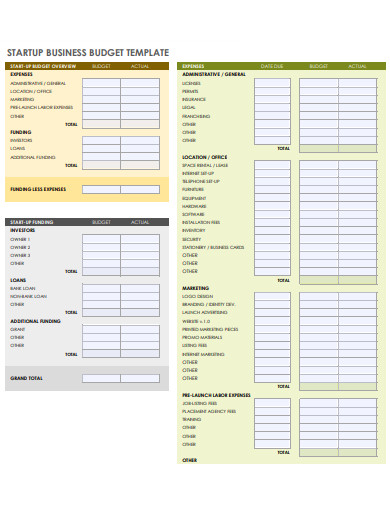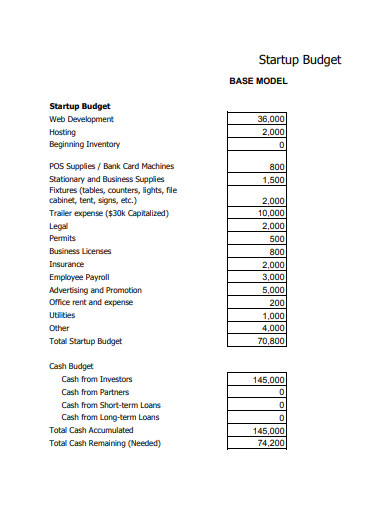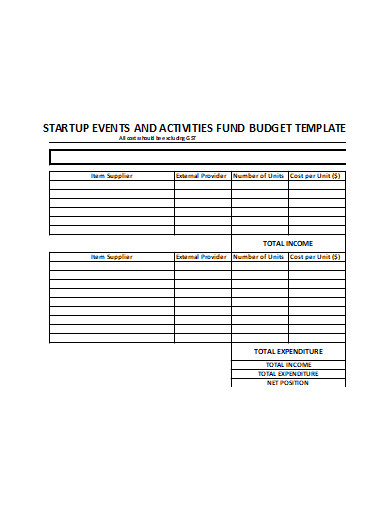For you to open your new business and start your operations in real-time, a budget is the most essential tool you must have to be able to start your business. You need to know how much money you’ll need for your capital and how much money you’ll need to have to pay for expenses and obtain the resources needed for your business. Without a budget, you’re more likely to squander your money and may run out of cash way too early by spending them to unnecessary expenses. A budget is what keeps your feet planted firmly in the ground to make wise decisions on how to budget your money. Read the article to know how to make a startup business budget.
5+ Startup Business Budget Samples
1. Startup Business Budget
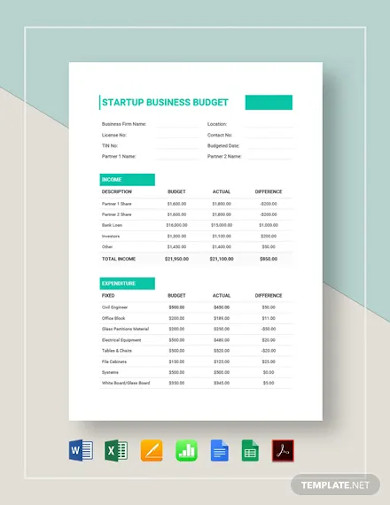
2. Small Business Startup Budget
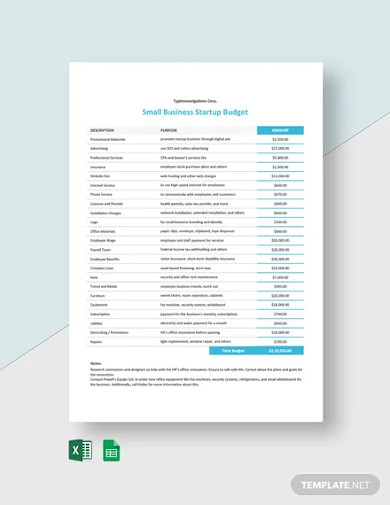
3. Financial Budget for Startup Business
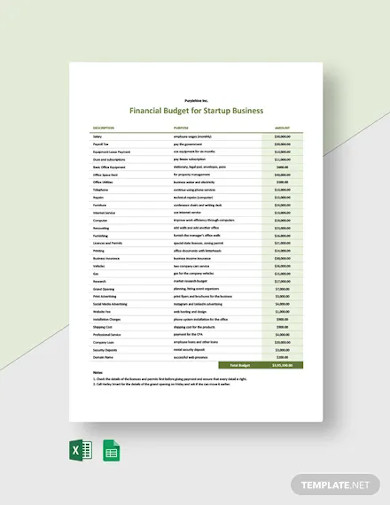
4. Simple Business Startup Budget
5. Business Startup Budget Example
6. Business Event Startup Budget
What is a Startup Budget?
A startup budget is the type of budget a businessperson needs to help plan on how to use their business capital to cover business costs so they can officially open their business and make it through for the first few months before they can earn enough revenue.
How to Create a Startup Business Budget
1. Set a Target Budget
Through your notebook or spreadsheet or accounting software, create your startup budget. Make a layout and a timeline that tally your fixed, variable expenses, and emergency expenses that you might have for your business, the money you currently have, and the budget goal you need to have in order to afford to pay for all your expenses. This part of the process is still a draft since you will be updating this as you go along.
2. List Your Startup Costs
This is now the part where you list down your startup costs. Your startup costs are the expenses you have to obtain the assets you need before launching your company.
There are two kinds of startup costs you’ll need to know about:
- Startup assets: Also called capital expenditures are usually one-time purchases of resources needed to kickstart your business such as inventory, computers, furniture, vehicles, property, and security deposits.
- Startup expenses: These are the fixed or variable expenses that you pay before you officially open your business. Examples of startup expenses are rent, electric bills, payroll, organizing fees, trademarks, telecommunications bills, etc.
3. List Your Fixed Costs
The next thing to do is to identify your business’s fixed costs, or also called overhead costs. These overhead costs are likely to remain the same for months or even years. For startups, your fixed costs could include rent or mortgage, payroll and benefits, insurance, internet and phone services, bank fees, etc. Review your fixed costs and list them down along with their amounts.
4. List Your Variable Costs
Identify your variable costs next. Variable costs are the type costs that can change depending on your business operations such as its operations and sales movement. Every month, these types of costs varies; they can either go up or go down. Examples of variable costs are raw materials, advertising and promotion materials, equipment, shipping costs, utilities, transportation, third party service fees and logistics providers, income taxes, etc.
5. Forecast Your Monthly Revenue
Now is the time to calculate your business revenue projection. To make a revenue projection make at least two types of them; an optimistic projection and a conservative projection. To calculate your projections, consider factors such as your target market, market share, and market conditions that could affect your revenue. Next, is to use your break-even analysis to estimate your monthly sales. Your revenue sources can come from product/service sales, loans, savings, and investment income just to name a few.
6. Calculate Your Total Costs
Once you’ve listed down all your expenses and calculated your monthly revenue, it’s time to add up all of your costs to calculate how much money you’ll need to start your business. If your initial capital is enough to cover your costs and even have a little bit more to cover for emergency purposes or other costs, that’s great. However, if the budget falls short, don’t go ahead and borrow more capital. Go over your expenses and crash out items that are not priorities for your business and you can save them for later purchasesor you can think up of cheap alternatives to help you save more money. Do these adjustments until you see that your capital can now cover your costs.
FAQs
Why is budgeting important to business?
Budgeting is important to businesses, whether small or large ones because:
- It helps determine when to hire employees
- It lets you buy equipment that you can invest in to help your business
- It finances your business costs
- It can help you predict cash shortfalls
- It can provide you funds for suppliers and emergency funds
- It will let you create a balance sheet that you can share with investors or lenders
How much budget do you need to start a business?
According to the U.S. Small Business Administration, most microbusinesses will cost around $3,000 to $5,000 to start their business.
Go over your entire budget tracker and review all the items you’ve listed down. Make sure they are all accurate, especially the amount of the fixed and variable costs you will have in order for you to operate your business. This is to ensure that you can still make adjustments before you finalize your budget and show it to lenders or investors if you’re going to make a business proposal. To help you get started making the contract, download our free sample templates above to use as your guide!
Related Posts
FREE 10+ Expense Budget Samples in MS Word | Google Docs | Google Sheets | MS Excel | PDF
FREE 4+ Vacation Budget Planner Samples in PDF
FREE 10+ Budget Outline Samples in PDF | MS Word
FREE 10+ Conference Budget Samples in MS Word | MS Excel | Google Docs | Google Sheets | Apple Pages | PDF
FREE 10+ Monthly Budget Worksheet Samples in PDF | MS Word | Google Docs | Google Sheets | Excel
FREE 10+ Monthly Project Budget Samples in MS Word | MS Excel | Google Docs | Google Sheets | PDF
FREE 10+ Corporate Budget Samples in MS Word | MS Excel | Google Docs | Google Sheets | PDF
FREE 9+ Primary School Budget Samples in MS Word | Google Docs | Google Sheets | MS Excel | PDF
FREE 10+ Operational Budget Samples in PDF | DOC
FREE 5+ Budget Layout Samples in PDF
FREE 6+ Paycheck Budget Samples in PDF | MS Word
FREE 10+ Architecture Budget Samples in PDF
FREE 10+ Capital Budget Samples in PDF | MS Word | Google Docs | Google Sheets | Excel | Apple Numbers | Apple Pages
FREE 10+ Budget Tracker Samples in PDF | DOC
FREE 4+ Corporate Monthly Budget Samples in MS Word | Google Docs | Google Sheets | Excel

